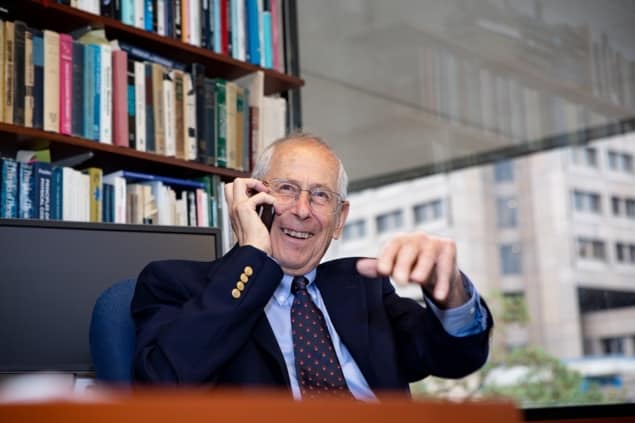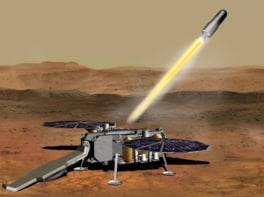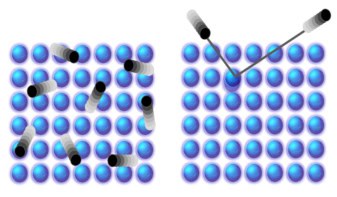
Physicists and astronomers have welcomed yesterday’s decision to award this year’s Nobel Prize for Physics to the discovery of the first exoplanet as well as research on the evolution of the universe. Despite some surprise regarding the mix of the two subjects in one prize, the award has been particularly welcomed by exoplanet researchers, who had worried that the Nobel Committee for Physics would ever deem it “fundamental enough” to be recognized.
James Peebles, Michel Mayor and Didier Queloz bagged the 2019 Nobel Prize for Physics “for contributions to our understanding of the evolution of the universe and Earth’s place in the cosmos”. Peebles won half the prize for “theoretical discoveries in physical cosmology” while Mayor and Queloz share the other half for “the discovery of an exoplanet orbiting a solar-type star”.
Over the past five decades, Peebles had made pioneering contributions to cosmology including dark matter and dark energy. He made a vital headway in predicting the properties of the Cosmic Microwave Background even before it was discovered as well as improving our understanding of how elements were formed soon after the Big Bang. He also came up with “cold dark matter” as a description of a universe filled partly with invisible matter and, according to astrophysicist Jo Dunkley from Princeton University, “also put back in the vacuum energy ‘Lambda’ to our list of cosmological ingredients — the dark energy that is still a mystery today”.
To see a field go from obscure, fringe, and laughable to Nobel-worthy is a huge tribute to people all around the world making exoplanets real
Sara Seager
“It was so obvious that Peebles should win the prize,” Dunkley told Physics World. “He really founded our entire field of modern cosmology — wherever you look in cosmology, you find Peebles’ vital contributions.” That view is shared by other astrophysicists, including Ofer Lahav from University College London, who says that the award to Peebles is “long overdue” and “well deserved”. “Through his articles and books he has inspired generations of cosmologists as well as pioneered the creation of large cosmological surveys, which are now at the core of cosmology research,” Lahav says.
Positive impact
Mayor and Queloz, meanwhile, have been awarded the prize for making the first discovery of a planet orbiting a star other than the Sun. In 1995, using custom-made instruments on the Haute-Provence Observatory in France, the pair detected the tiny wobbling motion of a star 50 light-years away. This wobble is caused by the close orbiting of a gas-giant planet called 51 Pegasi b, which is about half the mass of Jupiter.
Alan Boss, from the Carnegie Institution for Science in the US, told Physics World that the award is “a splendid surprise” and that Mayor and Queloz “fully deserve” to be recognized given they were the first to find proof of a planet in orbit around another sun-like star. “The surprise is that it took the Nobel committee nearly 25 years to recognize this huge discovery,” says Boss. He adds that their finding helped to foster support for NASA’s Kepler Space Telescope, which has since spotted thousands of exoplanets and determined that potentially habitable, Earth-like worlds are commonplace in our galaxy. “[It] is certainly the most astounding discovery in the last decade about our physical universe,” says Boss.
Sara Seager, an astronomer at the Massachusetts Institute of Technology, says the award for exoplanets is a “cataclysmic shift” for the subject. “To see a field go from obscure, fringe, and laughable to Nobel-worthy is a huge tribute to people all around the world making exoplanets real,” she told Physics World, adding that she hopes that there will be a “huge positive impact” in terms of funding for dedicated exoplanet missions in future.
Like all huge achievements, the discovery of 51 Pegasi b by Mayor and Queloz had important forerunners all of whom could claim a first for exoplanets
Elizabeth Tasker
Exoplanet researcher Jason Wright from Penn State University, meanwhile, says that he is “very pleased” to see the award go to Mayor and Queloz and that it is “well deserved”. He also admits never imagining the Nobel committee would dedicate a prize to the first exoplanets. “I did not think the committee would think of it as sufficiently fundamental to physics,” he says.
Early pioneers
As with all Nobel prizes, the requirement to limit the award to no more than three people — stipulated in the will of Alfred Nobel — will have made the 2019 prize as tricky as ever. Other pioneers who will surely have been considered by the committee will have been astronomer Geoff Marcy and his colleague Paul Butler from the Carnegie Institution for Science, who were both early pioneers in exoplanetary science. Butler, who is currently carrying out observations on the Magellan telescopes in Chile, told Physics World that the committee “had recognized the accomplishments of three great researchers,” adding that “their work has helped illuminate our understanding of the universe, and to redefine our relationship with the universe.” Another thorny matter is that in 2015 Marcy was found to have violated the University of California, Berkeley’s sexual-harassment policy.
Exoplanet researcher Elizabeth Tasker at the Japan Aerospace Exploration Agency told Physics World that there were many people before Mayor and Queloz – and indeed Marcy and Butler — that made important contributions. “Like all huge achievements, the discovery of 51 Pegasi b by Mayor and Queloz had important forerunners all of whom could claim a first for exoplanets,” she says. James Peebles, Michel Mayor and Didier Queloz share Nobel Prize for Physics
In particular, in 1988, a Canadian team of astronomers, led by Gordon Walker, Bruce Campbell and Stephenson Yang, detected the “wobble” of Gamma Cephei A using a new absorption cell that allowed much higher precision measurements of a star’s radial velocity. However, the trio didn’t have enough support to claim it was a planet – something that was only later confirmed in 2004. Then in 1992, Alex Wolszczan from Penn State University and Dale Frail at the National Radio Astronomy Observatory in Socorro, New Mexico, announced two rocky planets around a pulsar – yet at the time these results were not widely accepted. “While these previous discoveries were equally as important to our knowledge of planet formation — it was the discovery of 51 Pegasi b that marked the flood gates opening to the discovery of new worlds,” adds Tasker.
Despite the plaudits for the individual researchers in this year’s award, some say that the mix of exoplanets and cosmology was unexpected. “Sharing the award between cosmology and extrasolar planets is a bit surprising given these are such different disciplines,” says Lahav. “But, in the spirit of the award’s citation about understanding ‘the Earth’s place in the cosmos’, this is perhaps an encouragement to study the universe in a more wholistic way.”
That view is backed up by Dunkley. “I think the mix of subjects awarded this year is interesting,” she says. “But there is a common thread — Peebles taught us how we came to be here in a galaxy full of stars and Mayor and Queloz discovered that planets beyond our own Solar System were created in this bigger arc of cosmic history. So together they take these huge strides towards understanding our place in the cosmos.”
- We have created a collection of key papers by Peebles, Mayor and Queloz, which are free to read until 31 October 2019.
Physics World‘s Nobel prize coverage is supported by Oxford Instruments Nanoscience, a leading supplier of research tools for the development of quantum technologies, advanced materials and nanoscale devices. Visit nanoscience.oxinst.com to find out more




